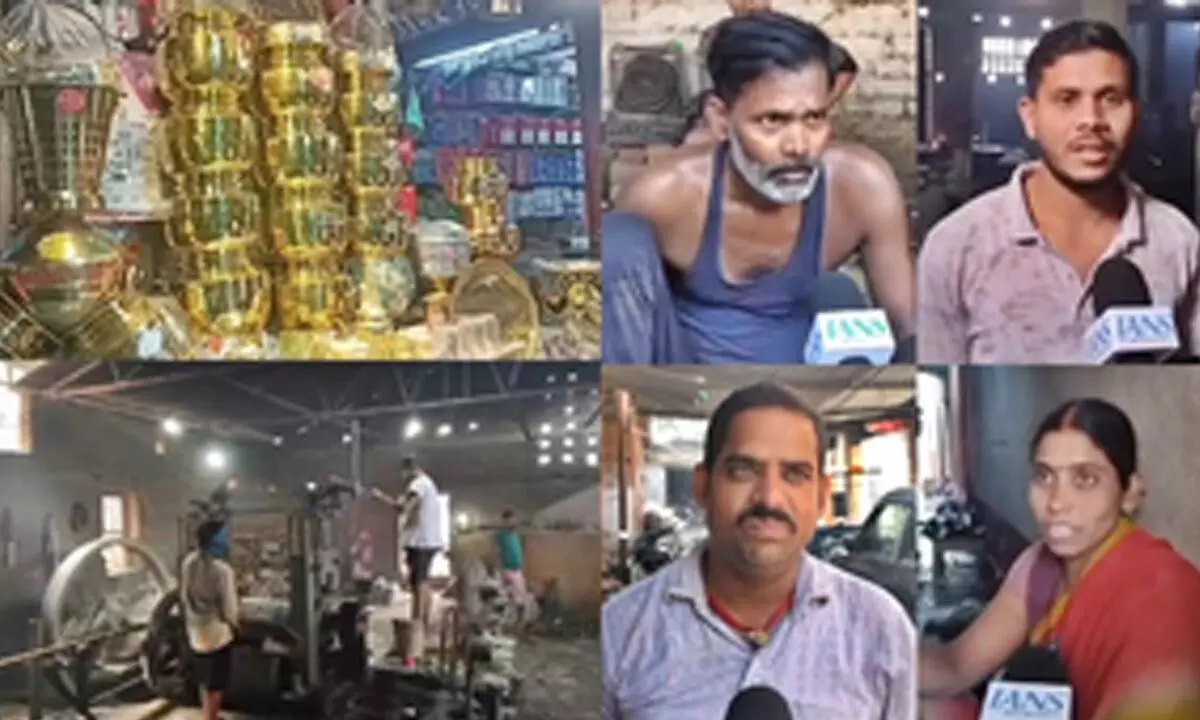Live
- Rohit Pathak: A rising star in Indian cinema with powerful villain roles
- Pooja’s ‘final day of shot for 2024’ makes waves
- Nayini Rajender Reddy Addresses Press Conference at Hanumakonda Congress Office
- ‘Game Changer’ pre-release event in Dallas is a blockbuster
- NDMC Vice Chairman hits out at AAP's registration drive; labels it 'election gimmick'
- No place for Stokes as Root returns to England’s squad for India ODIs and Champions Trophy
- Kuwait bestows its highest honour 'The Order of Mubarak Al Kabeer' to PM Modi
- Kia to launch compact SUV 'Syros' in India next year
- Completely disagree: Swami Rambhadracharya on Mohan Bhagwat's 'Hindu leaders' remarks
- ISL 2024-25: NorthEast United aim to regain form against struggling Hyderabad
Just In
Pital Nagari of Patna: Timeless craft by Parev villagers hog national attention

About 40 kilometres from the bustling capital of Bihar lies a village named Parev, which has shot to fame with its new found identity as 'Pital Nagari.' The village is a non-descript region with moderate rural population but over the years, it has come under the spotlight because of its emergence as a thriving hub of brass utensil manufacturing.
Patna: About 40 kilometres from the bustling capital of Bihar lies a village named Parev, which has shot to fame with its new found identity as 'Pital Nagari.' The village is a non-descript region with moderate rural population but over the years, it has come under the spotlight because of its emergence as a thriving hub of brass utensil manufacturing.
Many households in the village have doubled up as a small factory and are engaged in the timeless craft of brasswork.
The clang of metal and the glow of flames is a regular feature in this village and remind one of their industrious spirit. As dusk falls, families gather to refine their craft - women polishing gleaming brassware, while men melting and giving shape to the metal.
This community effort has transformed the village into a vibrant tapestry of shared labour, where the age-old skills have been passed down through generations.
With over 300 cottage industries and more than 200 skilled artisans, Parev's economy is intricately tied to brasswork.
The village's workforce is predominantly made up of families who collaborate in various stages of production.
Roshan, a factory owner stated, "My grandfather and great-grandfather have been making these items. I’ve been managing the business for five years, continuing a tradition that has shaped our identity."
"The process begins with sourcing scrap brass, which is then melted in furnaces and moulded into various utensils. We still rely heavily on traditional methods," Roshan explained, noting that around 80% of the work is done by hand.
Only a small portion depends on electricity, thus making artisans an indispensable workforce of the 'Pital Nagari'.
Among the artisans, women play a vital role, often balancing household responsibilities with brasswork.
Babita Devi, a seasoned artisan, reflecting on a decade of dedication, said, "We also refurbish old utensils, bringing them back to life." This work is not merely a means of livelihood; it is a cherished family tradition, deeply embedded in their daily routines.
Resident Rinku Kumar echoes this sentiment, stating, "Parev has long been recognised for its brasswork. Our ancestors engaged in this craft, and we continue to honour that legacy."
However, Rinku also notes a shift in consumer preferences, as modern materials like steel and fiber increasingly dominate the market.
The rise of stainless steel and fibre utensils poses challenges for the brass industry.
Rajat Kumar, another artisan, admits that demand has declined, as many consumers now prioritise contemporary materials over traditional brass.
"Despite the changes, we remain committed to handcrafting our products. The quality and cultural significance of brass are irreplaceable," he asserts.
Shopkeeper Shubham Kumar pointed out that preparations for Dhanteras, a significant festival for purchasing new utensils, are in full swing. "Sales of brass utensils remain steady, even in competition with stainless steel. People still value the craftsmanship and tradition behind our products," he stated confidently.
The village stands as a testament to the enduring nature of craftsmanship and community, where every utensil tells a story of familial bonds and cultural pride.

© 2024 Hyderabad Media House Limited/The Hans India. All rights reserved. Powered by hocalwire.com






